Michael Shermer speaks with University Professor of Philosophy and Neural Science and codirector of the Center for Mind, Brain and Consciousness at New York University, Dr. David Chalmers, about his book Reality+: Virtual Worlds and the Problems of Philosophy.
Tags
-
browse by topic
determinism
eSkeptic for March 19, 2022
Sally Satel on Addiction, the Opioid Crisis, Deaths of Despair, and How Psychiatry Has Gone Woke
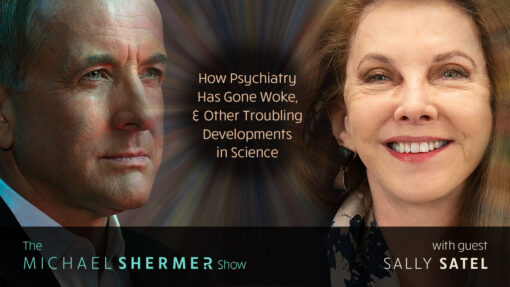
Michael Shermer and professor of psychiatry, Sally Satel, discuss: how political correctness has corrupted medicine • how wokeness and social justice activism has corrupted psychiatry • What is social justice and who is really practicing it? • medical models of mental illness • why mental illness is so hard to treat • medical models of addiction: where they succeed, where they fail • how addictions are treated • Can one be addicted to porn? • Can one be addicted to…
eSkeptic for January 22, 2022
In episode 243 of The Michael Shermer Show, Michael speaks with psychiatrist Dr. Sally Satel about addiction, the opioid crisis, deaths of despair, and how psychiatry has gone woke.
Antonio Damasio — Feeling & Knowing: Making Minds Conscious
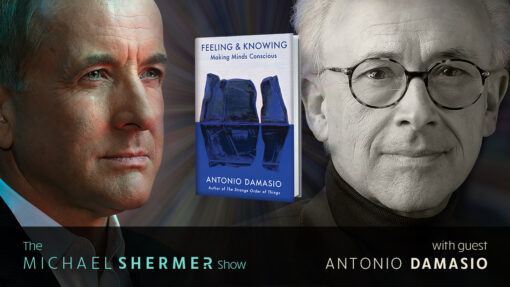
In episode 221, Michael Shermer speaks with Antonio Damasio about recent findings across multiple scientific disciplines that have given rise to new understandings of consciousness.
eSkeptic for October 26, 2021
In episode 221, Michael Shermer speaks with Antonio Damasio about recent findings across multiple scientific disciplines that have given rise to new understandings of consciousness.
Philip Zimbardo — The Nature and Nurture of Good and Evil
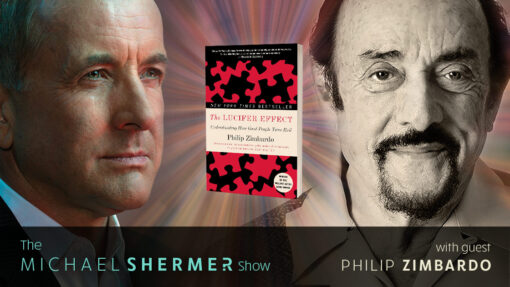
August 15 marks the 50th anniversary of day one of the Stanford Prison Experiment — one of the most controversial studies in the history of social psychology. In episode 200, Michael Shermer speaks with renowned social psychologist and creator of the Stanford Prison Experiment Philip Zimbardo, exploring the mechanisms that make good people do bad things, how moral people can be seduced into acting immorally, and what this says about the line separating good from evil.
eSkeptic for August 15, 2021
In episode 200, Michael Shermer speaks with renowned social psychologist and creator of the Stanford Prison Experiment Philip Zimbardo, exploring the mechanisms that make good people do bad things, how moral people can be seduced into acting immorally, and what this says about the line separating good from evil.
Bernardo Kastrup on the Nature of Reality: Materialism, Idealism, or Skepticism
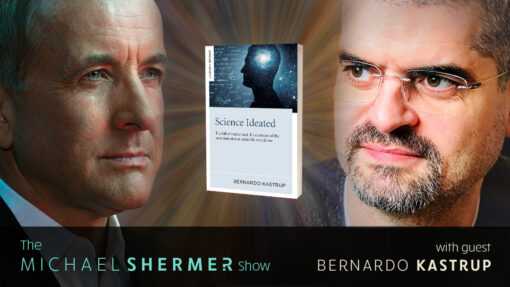
In this expansive conversation, Michael Shermer speaks with Bernardo Kastrup, the executive director of Essentia Foundation. His work has been leading the modern renaissance of metaphysical idealism, the notion that reality is essentially mental. Shermer and Kastrup discuss: materialism, idealism, dualism, monism, panpsychism, free will, determinism, consciousness, the problem of other minds, artificial intelligence, out of body and near-death experiences, model dependent realism, and the ultimate nature of reality.
eSkeptic for August 7, 2021
In this expansive conversation, Michael Shermer speaks with Bernardo Kastrup, the executive director of Essentia Foundation. His work has been leading the modern renaissance of metaphysical idealism, the notion that reality is essentially mental. Shermer and Kastrup discuss: materialism, idealism, dualism, monism, panpsychism, free will, determinism, consciousness, the problem of other minds, artificial intelligence, out of body and near-death experiences, model dependent realism, and the ultimate nature of reality.
Robert Cialdini — Influence: The Psychology of Persuasion
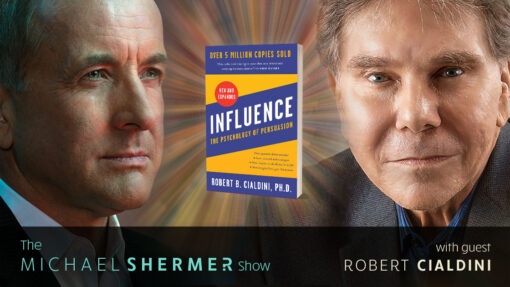
In episode 187, Michael speaks with Robert Cialdini — New York Times bestselling author of Pre-Suasion and the seminal expert in the fields of influence and persuasion — about the psychology of why people say yes and how to apply these insights ethically in business and everyday settings.
eSkeptic for June 8, 2021
In episode 187, Michael speaks with Robert Cialdini — New York Times bestselling author of Pre-Suasion and the seminal expert in the fields of influence and persuasion — about the psychology of why people say yes and how to apply these insights ethically in business and everyday settings. PLUS, the newest issue of Skeptic magazine (26.2: Drug Trips & Reality) is now available in print and digital formats.
Daniel Dennett & Gregg Caruso — Just Deserts: Debating Free Will (moderated by Michael Shermer)
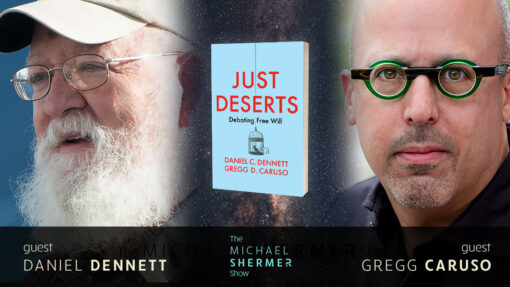
The concept of free will is profoundly important to our self-understanding, our interpersonal relationships, and our moral and legal practices. If it turns out that no one is ever free and morally responsible, what would that mean for society, morality, meaning, and the law? This conversation brings together two philosophers — Daniel C. Dennett and Gregg D. Caruso — to debate their respective views on free will, moral responsibility, and legal punishment.
eSkeptic for March 30, 2021
In The Michael Shermer Show # 168, Dr. Shermer moderates an entertaining, rigorous, and sometimes heated philosophical dialogue between two leading thinkers: Daniel Dennett and Gregg Caruso, based on their book Just Deserts.
Philip Goff — Galileo’s Error: Foundations for a New Science of Consciousness
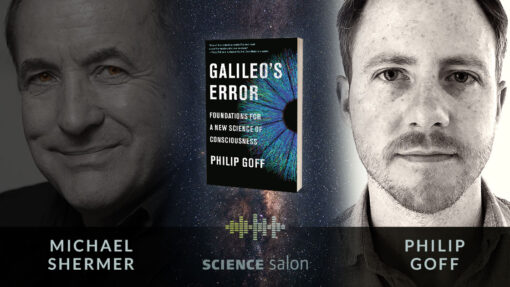
Shermer and Goff discuss: the problem Galileo’s approach to science solved • dualism, monism, panpsychism • idealism • hard problem of consciousness • ultimate nature of reality • model dependent realism • Arthur Stanley Eddington and Bertrand Russell build panpsychism back into science • philosophical zombies • free will, determinism, compatibilism • objective moral values • fine tuning and the multiverse.
eSkeptic for November 9, 2020
In Science Salon # 142 Michael Shermer speaks with Philip Goff about his new book Galileo’s Error: Foundations for a New Science of Consciousness. PLUS, we celebrate Carl Sagan’s birthday; he would have been 86 years old today.
Matthew Cobb — The Idea of the Brain: The Past and Future of Neuroscience
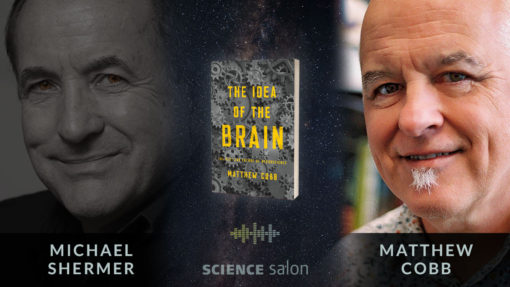
In Science Salon # 115, Michael Shermer speaks with scientist and historian Matthew Cobb about his book The Idea of the Brain: The Past and Future of Neuroscience which traces how our conception of the brain has evolved over the centuries.
eSkeptic for May 12, 2020
In Science Salon # 115, Michael Shermer speaks with scientist and historian Matthew Cobb about his book The Idea of the Brain: The Past and Future of Neuroscience which traces how our conception of the brain has evolved over the centuries.
Ann Druyan — Cosmos: Possible Worlds
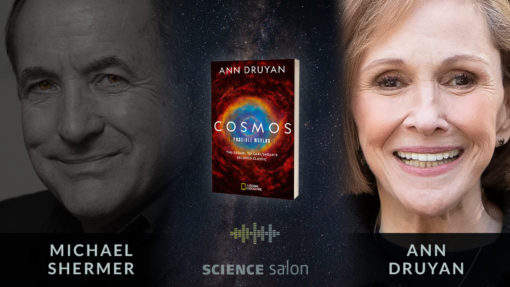
In this sequel to Carl Sagan’s beloved classic and the companion to the hit television series hosted by Neil deGrasse Tyson, the primary author of all the scripts for both this season and the previous season of Cosmos, Ann Druyan explores how science and civilization grew up together. From the emergence of life at deep-sea vents to solar-powered starships sailing through the galaxy, from the Big Bang to the intricacies of intelligence in many life forms…
eSkeptic for April 21, 2020
In Science Salon # 112 Michael Shermer speaks with Ann Druyan about her book Cosmos: Possible Worlds, exploring how science and civilization grew up together. This book is the sequel to Carl Sagan‘s beloved classic and the companion to the hit television series hosted by Neil deGrasse Tyson.
Brian Greene — Until the End of Time: Mind, Matter, and Our Search for Meaning in an Evolving Universe
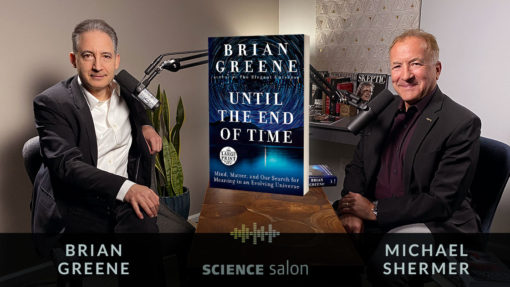
Until the End of Time is Brian Greene’s breathtaking new exploration of the cosmos and our quest to find meaning in the face of this vast expanse. Greene takes us on a journey from the big bang to the end of time, exploring how lasting structures formed, how life and mind emerged, and how we grapple with our existence through narrative, myth, religion, creative expression, science, the quest for truth, and a deep longing for the eternal.
SKEPTIC App
Whether at home or on the go, the SKEPTIC App is the easiest way to read your favorite articles. Within the app, users can purchase the current issue and back issues. Download the app today and get a 30-day free trial subscription.








